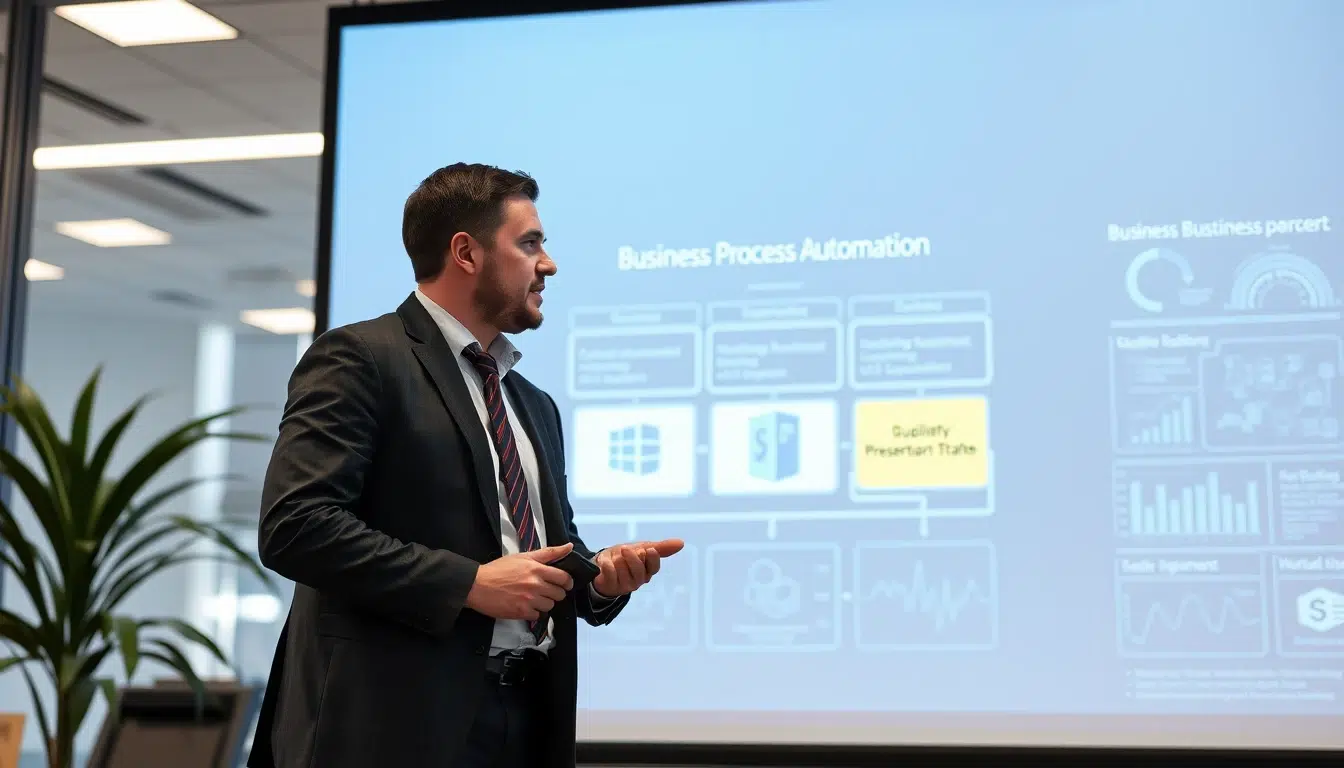Business Process Management (BPM) Certification Training Course

| Date | Format | Duration | Fees (USD) | Register |
|---|---|---|---|---|
| 03 Dec - 05 Dec, 2025 | Live Online | 3 Days | $2290 | Register → |
| No upcoming Schedule available for this course. | Register |
|---|---|
| Take control of your schedule! Choose your preferred dates and locations. click the register button. | Register |
Did you know that Business Process Management (BPM) implementation can increase employee confidence by involving team members in process improvement, making them feel valued and an important part of the company?
Course Overview
The Business Process Management (BPM) Certification Training Course by Alpha Learning Centre is meticulously designed to equip professionals with essential skills in BPM principles, methodologies, and implementation. This course focuses on how professionals can effectively manage business processes through modelling, mapping, and analysis to enhance organisational performance and drive continuous improvement.
Why Select This Training Course?
Selecting this BPM Certification Course offers numerous advantages for professionals involved in process improvement and operational excellence. Participants will gain advanced knowledge of process design, analysis, and implementation techniques. The course provides hands-on experience with industry-standard BPM tools and real-world case studies, enabling attendees to optimise their process management strategies effectively.
For organisations, investing in this training enhances overall operational efficiency and ensures better business agility. Research shows that organisations implementing comprehensive BPM frameworks can achieve enhanced staff satisfaction as employees avoid manual tasks and focus on activities requiring more attention, leading to reduced turnover.
For individuals who complete this course will benefit from enhanced career prospects as they become more valuable assets in their respective fields. Studies indicate that professionals with BPM expertise can significantly improve their career trajectory as BPM certification helps employers define job objectives, evaluate candidates, assess employee performance, and motivate employees to enhance their skills.
Transform your process management capabilities – Register now for this critical advanced training programme!
Who is this Training Course for?
This course is targeted at:
- Business Analysts
- Process Managers
- Operations Managers
- Project Managers
- IT Professionals involved in process improvement initiatives
- Quality Assurance Professionals
- Organisational Development Managers
- Business optimisation consultants
What are the Training Goals?
After attending this training course, participants will be able to:
- Understand the principles and practice Business Process Management.
- Apply BPM methodologies while analysing and improving business processes.
- Acquire techniques on effective process mapping and modeling.
- Learn how the implementation of BPM tools and technologies is done in order to automate the processes.
- The capability to develop monitoring, measurement, and optimising process performance
- Learn about integration of BPM with organisational strategy.
How will this Training Course be Presented?
The Business Process Management (BPM) Certification Training Course delivers comprehensive, hands-on training through proven methodologies designed to maximise learning outcomes and practical skill development. Our expert instructors employ the following methods:
- Interactive workshops
- Real-world case studies
- Hands-on exercises
- Group discussions
- Role-playing scenarios
- Practical assignments
Each delivery method is carefully integrated to ensure participants gain both theoretical knowledge and practical experience. The course structure promotes active engagement and real-world application, allowing participants to develop crucial analytical and strategic skills within a supportive learning environment.
Join us to experience this dynamic and effective learning approach – Register now to secure your place!
Course Syllabus
Module 1: BPM Fundamentals and Strategy
- Understanding BPM lifecycle.
- Linking BPM to business strategy.
- Identifying process improvement opportunities.
- Process mapping techniques.
- Metrics for process performance.
- BPM maturity models.
- Stakeholder analysis in BPM.
- Process classification frameworks.
- Business case development for BPM.
- Process governance structures.
- BPM methodologies overview.
- Cultural readiness for BPM.
Module 2: Process Design and Modelling
- Advanced BPMN notation.
- Process model validation.
- Designing for process agility.
- Process simulation for optimisation.
- Modelling complex business scenarios.
- Process decomposition for clarity.
- Swimlane diagrams for accountability.
- Decision modelling within processes.
- Error handling in process design.
- Process documentation standards.
Module 3: Process Analysis and Improvement
- Root cause analysis methodologies.
- Lean management in process redesign.
- Six Sigma tools for process control.
- Value stream mapping for efficiency.
- Identifying and eliminating process waste.
- Process performance benchmarking.
- Cycle time and throughput analysis.
- Quality assurance in BPM.
- Change impact analysis.
- Techniques for process standardisation.
Module 4: BPM Implementation
- Project management for BPM initiatives.
- Change management strategies.
- Training for process adoption.
- Technology selection for BPM.
- Integration of BPM tools with IT systems.
- Automation and process execution.
- Monitoring and controlling processes.
- Handling resistance to process change.
- Process compliance and regulatory adherence.
- Deployment strategies for new processes.
- Measuring implementation success.
- Post-implementation reviews.
Module 5: Process Measurement and Metrics
- Defining process KPIs.
- Performance dashboards for BPM.
- Data analytics in process management.
- Cost-benefit analysis of BPM changes.
- Process efficiency metrics.
- Quality metrics in process evaluation.
- Customer satisfaction metrics.
- Process throughput and capacity.
- Continuous monitoring for performance.
- Benchmarking against industry standards.
Module 6: BPM and Technology
- BPM software selection criteria.
- Integration with existing IT infrastructure.
- Data management in BPM systems.
- Security considerations in BPM.
- Workflow automation tools.
- Process mining for discovery.
- Decision management systems.
- API and middleware for BPM integration.
- User interface design for BPM applications.
- Maintaining process integrity in tech changes.
Module 7: Organisational Change Management
- Cultural alignment with BPM.
- Change leadership in BPM contexts.
- Communication strategies for BPM.
- Employee engagement in process changes.
- Managing stakeholder expectations.
- Resistance management techniques.
- Process champion development.
- Feedback mechanisms for process improvement.
- Evaluation of change readiness.
Module 8: BPM in Complex Environments
- BPM in matrix organisations.
- Managing processes across departments.
- Multi-level process governance.
- Process management in global operations.
- Compliance with international standards.
- Handling process variability.
- Process integration in mergers and acquisitions.
- Managing process complexity.
Module 9: Risk Management in BPM
- Risk identification in process management.
- Compliance risk in BPM.
- Operational risk assessment.
- Mitigation strategies for process risks.
- Business continuity planning with BPM.
- Regulatory compliance frameworks.
- Process audits for risk control.
- Risk-based process design.
- Monitoring risks in process execution.
Module 10: BPM Leadership and Performance
- Leadership styles for BPM success.
- Motivating teams in BPM initiatives.
- Developing a BPM vision.
- Performance management in BPM.
- Coaching and mentoring for BPM adoption.
- BPM project prioritisation.
- Sustaining BPM gains.
- Evaluating BPM leadership effectiveness.
Training Impact
The impact of business process management training is evident through various real-world case studies and data, which demonstrate the effectiveness of structured programmes in enhancing operational efficiency and business agility.
Research indicates that professionals with strong BPM skills can improve measurability by evaluating processes one after another and comparing them to projected outcomes, helping to supervise processes and human resources, increase customer satisfaction through modest processes and enhanced effectiveness, and ensure compliance and transparency by incorporating regulatory requirements promptly into processes.
These case studies highlight the tangible benefits of implementing advanced BPM techniques:
- Improved process efficiency and effectiveness
- Enhanced customer satisfaction through streamlined processes
- Increased compliance and transparency in operations
- Strengthened employee engagement and satisfaction
By investing in this advanced training, organisations can expect to see:
- Significant improvement in operational efficiency
- Improved ability to handle complex process challenges
- Enhanced decision-making capabilities in process management
- Increased competitiveness through comprehensive BPM strategies
Transform your career and organisational performance – Enrol now to master Business Process Management!








